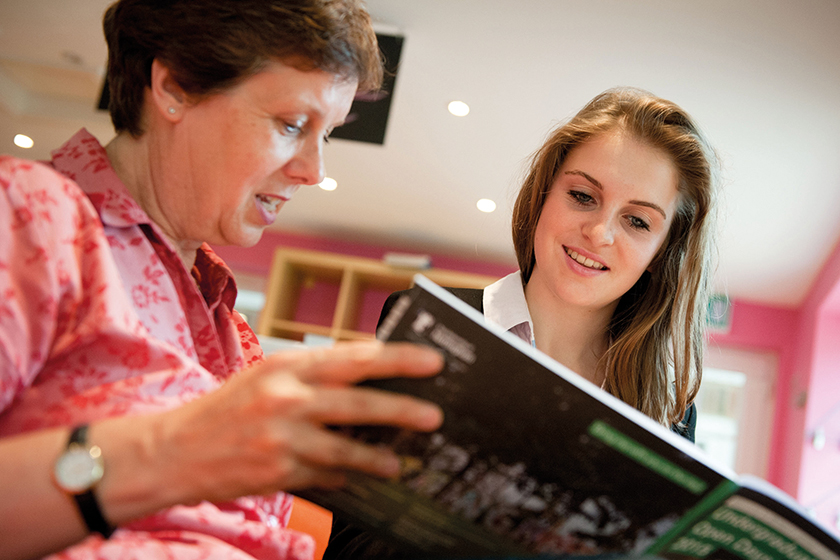Everything you Need to Know About Careers Guidance
By
7 years ago
Choosing what to do isn’t about deciding which career path to follow, but working out what you have to offer and then getting on with it

Want to find out what careers guidance is offered at the best independent schools? Victoria Lambert assesses the different ways in which pupils are motivated to follow their chosen path.

The increasingly sophisticated careers guidance on offer at schools is undoubtedly a major factor in young people taking university courses that lead to employment. Yet, while the unemployment rate for university leavers is lower than popularly surmised, there are still many young people who are yet to find a direction they really enjoy and can sustain long term.
Many parents are finding – sometimes to their horror – that young people will simply not accept work without joy as previous generations did. Instead they are taking on post-university gap years, applying for postgraduate diplomas, or even returning home to the nest while they try to decide on their futures.
Schools are attempting to tackle the problem head on, coming up with creative approaches to careers guidance.
Independent schools with excellent careers guidance
Millfield School
Its expansive higher education and careers department is staffed full time by a careers secretary and six other members of staff. This includes an American university tutor, Oxbridge and UK university advice tutors and a careers adviser. What’s more, the school has a fully-equipped careers library and computer terminals. Pupils begin a programme of activities to help them think of their strengths and interests from Year 9.
Moreton Hall
At independent girls’ school, Moreton Hall in Shropshire, careers education begins in Year 7. Online tools such as The Career Investigator and the Morrisby Fast Tomato careers programme are popular. Preparations for applications to Higher Education and other post-18 opportunities begin in the autumn term of Year 12 through talks and seminar work with tutors and individual interviews. Students also attend the careers convention each February.
Charterhouse
Pupils at the Surrey school can still benefit up to five years after they leave (until the age of 23) from the school’s status as a member school of the Independent School Careers Organisation (ISCO), a charity which provides expert careers education and guidance, plus opportunities for psychometric profiling and counselling.
Careers guidance: What the experts say
Kedge Martin, CEO of Longbow
Longbow is a life and careers consultancy that offers coaching and personal development.
‘Setting out on the right route is always important. We see young people who may or may not have graduated from university for individual face-to-face coaching, ad hoc remote telephone or email support and we facilitate introductions. One of the first questions we ask is: what would you do if money was no object? We start with that.
‘Some people say they’d like to go into the creative workspace but it doesn’t pay, or others still want to travel, to explore, and to them, I might say, what’s stopping you saving the money up to do that?
‘Others might have a rough idea – like wanting to do something with meaning, but feel they must follow a path like the City. We might arrange for placements or conversations with mentors from different fields so that they can see what that alternative future might look like.
‘We don’t suggest careers; there’s no menu. Instead, we try to find out what makes applicants tick, and then provide opportunities to help explore that. But we only work with the willing – you have to be personally committed and take responsibility for finding the right direction in the first place.’
John Liberty, consultant at GSM London
GSM London is a a higher education college that offers degrees in partnership with Plymouth University.
‘I want students to understand that companies are hiring a person not a qualification. So what they need to do is convey who they are and what they can offer. I ask them, what are you most proud of?’
‘This could be an engagement with a cause or an experience they have had in the UK or abroad. It might be an ability with languages. Students undervalue the importance companies place on an ability to communicate across cultures.
‘Don’t think, I want to be an accountant, therefore I must look for accountancy firms. Think, who would you like to work for, who do you admire, what is their ethical stance, or business success. Then look for opportunities within that company.
‘Target them early on, follow them on social media, understand them – then apply to them. You want to work for someone you respect and do what you enjoy.’
Louise Myles, founder of The Work Ladder
The Work Ladder is a consultancy aimed at supporting school-age children build their future employability skills. Louise Myles goes into schools such as St Swithun’s in Winchester, to offer three workshops for older children.
‘You cannot start early enough with preparing for future careers. I cover work etiquette in one workshop, commercial awareness in another, but the first covers what it takes to get a job. This means explaining what employers want and mean by certain skills.
‘For example, communications skills covers whether you can give clear instructions, negotiate well, write clearly and are a good listener. I teach them about teamwork and leadership.
‘But what really pays off is asking them to write a CV as it highlights whether they need to take on some kind of work and what values they may have gained as a result. Even if they just do babysitting, they should try and approach it professionally by setting up a website, preparing a marketing plan, learning basic accounts – employers want to see that they really understand what’s involved in running a business.’
She adds: ‘Their CV shouldn’t just tell an employer what they have done but show what they are capable of.’



